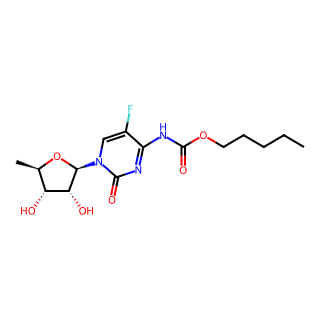- Synthetic anti-infective drugs
- Medications for the digestive system
- Antipyretic and analgesic drugs
- Medications for the blood system
- Medications for the respiratory system
- Anti-allergic drugs
- Medications for the urinary system
- Diagnostic medications
- Immunosuppressive and immunomodulatory drugs
- Vitamins and mineral supplements
- Antioxidants and medications for osteoporosis
- Antiparasitic drugs
- Ophthalmic medications
- Amino acids and their derivatives
- Dermatological medications
- Medications for the circulatory system
- Antitumor drugs
- Medications for the nervous system
- Hormonal and endocrine function-regulating drugs
- Antibiotics
- Others
CAS Number: 154361-50-9




Basic Information
Product Name: Capecitabine
CAS Number: 154361-50-9
Molecular Formula: C15H22FN3O6
Molecular Weight: 359.35
Appearance: White to beige powder or solid (also described as a colorless solid in some sources)
Physical Properties
Density: Approximately 1.49~1.5±0.1 g/cm³ (with slight variations in different sources)
Melting Point: 110~121°C
Boiling Point: 437.9~517.6±60.0°C (measured under different conditions)
Flash Point: 87~218.6°C (with slight variations in different sources)
Solubility: Soluble 10 mg/mL in water (under heating conditions), demonstrating good water solubility
Vapor Pressure: 0.0±3.1 mmHg at 25°C
Refractive Index: 1.600
Chemical Properties
Stability: Stable under specific storage conditions (such as 2~8°C or -20°C freezer)
Reactivity: Converts to 5-FU (5-fluorouracil) in vivo, which is an antimetabolite fluoropyrimidine carbamate drug
Pharmaceutical Properties
Pharmacological Action: Inhibits cell division and interferes with RNA and protein synthesis, thereby exerting anticancer effects
Indications: Primarily used for the treatment of advanced primary or metastatic breast cancer, rectal cancer, colon cancer, gastric cancer, non-small cell lung cancer, pancreatic cancer, bladder cancer, and other solid tumors
Dosage and Administration: Typically recommended dosage is 1250 mg/m², taken orally twice daily (morning and evening), for two weeks followed by a one-week break, constituting a three-week treatment cycle (specific dosage and administration should be adjusted according to the patient's condition and medical advice)
Drug Interactions: May interact with anticoagulants (such as warfarin), enzyme inducers (such as carbamazepine), enzyme inhibitors (such as ketoconazole), and other drugs, affecting efficacy or increasing toxicity and side effects, so special attention should be paid during use

Tai Yau Street, San Po Kong, Kowloon, Hong Kong, China.



